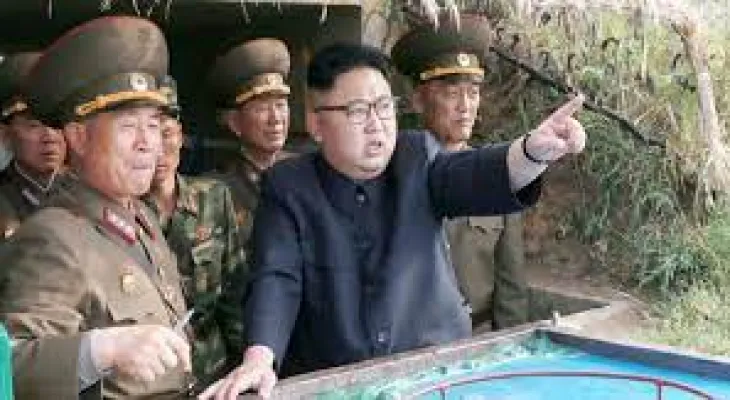Search here
Newspaper
Search here

Arab Canada News
News

Published: May 4, 2022
South Korean and Japanese officials said North Korea launched a ballistic missile toward its eastern waters on Wednesday, just days after North Korean leader Kim Jong Un pledged to enhance his nuclear arsenal "at the fastest possible pace" and threatened to use it against his country's enemies.
The launch, the fourteenth round of weapon tests by North Korea this year, came six days before a new conservative South Korean president takes office for a single five-year term.
South Korea's Joint Chiefs of Staff said in a statement that the missile was launched from the northern capital region and headed toward waters off the east coast.
The repeated ballistic missile launches by North Korea were described as "an act of grave threat" undermining international peace and security and violating UN Security Council resolutions banning any ballistic launches by North Korea.
The statement said South Korean Joint Chiefs of Staff Chairman Won In-chol held a video conference on the launch with General Paul LaCamera, the U.S. general heading the combined forces command in Seoul, and agreed to maintain a strong joint defensive posture. Japan also monitored the North Korean launch and quickly condemned it.
Japanese Prime Minister Fumio Kishida told reporters during his visit to Rome that "The series of actions taken by North Korea that threaten the peace, safety, and stability of the international community is unacceptable."
Kishida said he would discuss the launch when he meets Italian Prime Minister Mario Draghi later on Wednesday. "Naturally, we will exchange views on the regional situation in the Indo-Pacific and East Asia, and I will explain accurately the regional realities including today's North Korean missile launch to understand the urgent situation in East Asia."
Japanese Deputy Defense Minister Makoto Oniki said he believes the missile fell in waters outside Japan's exclusive economic zone.
There were no reports of damage or injuries from ships and aircraft in the area. It was not immediately known what type of missile North Korea launched.
The South Korean military said the missile flew about 470 kilometers at a peak altitude of 780 kilometers, while Japanese Oniki said it traveled about 500 kilometers at a maximum height of 800 kilometers.
Observers say the unusual speed North Korea has achieved in weapons testing this year confirms its dual goal of advancing its missile programs and pressuring Washington on deepening the freeze of nuclear talks.
They say Kim ultimately aims to use his expanded arsenal to gain international recognition of North Korea as a nuclear state, which is believed to help force the United States to ease international economic sanctions on North Korea.
One of the recently tested North Korean missiles was an intercontinental ballistic missile capable of reaching all parts of the United States.
This missile launch broke Kim's self-imposed 2018 ban on major weapons tests. There are indications that North Korea is also preparing for a nuclear test at the remote northeastern test facility.
If North Korea conducts a nuclear bomb test, it would be the seventh of its kind and the first since 2017. Last week, Kim Jong Un displayed his strongest nuclear-capable missiles targeting both the United States and its allies during a massive military parade in the capital, Pyongyang.
During a speech at the parade, Kim said he would develop his arsenal "at the fastest possible pace" and warned that North Korea would preemptively use its nuclear weapons if its national interests were threatened.
North Korea had previously issued harsh statements threatening to attack its rivals with nuclear weapons. But the fact that Kim personally issued the threat in a detailed manner has caused security tensions among some South Koreans.
Given North Korea’s recent tests of short-range missiles capable of carrying nuclear warheads, some experts expect that North Korea’s potential escalatory nuclear doctrine would allow it to conduct preemptive nuclear strikes against South Korea in some cases.
Wednesday’s launch came before the inauguration of elected South Korean president Yoon Suk-yeol, who pledged to strengthen Seoul's missile capabilities and consolidate its military alliance with Washington to better address North Korea’s increasing nuclear threats.
North Korea has a history of provoking hostilities through weapons tests when Seoul and Washington open new governments in an overt attempt to strengthen their influence in future negotiations.
Yoon’s office described the latest North Korean launch as a "grave provocation" and urged Pyongyang to stop actions that escalate tensions and threaten international peace. In a statement, Yoon’s government said it would respond strongly to North Korean provocations in close cooperation with the international community.
Some experts say the Biden administration's passive handling of North Korea, as it focuses on Russia’s invasion of Ukraine and intense competition with China, gives North Korea more room to expand its military capabilities. So far, the Biden administration's actions regarding North Korea have largely been limited to symbolic sanctions and offers for open talks.
North Korea rejected the administration’s offer for talks, saying it must first abandon its "hostile policy," a clear reference to U.S.-led international sanctions and joint U.S.-South Korean military drills.
Comments